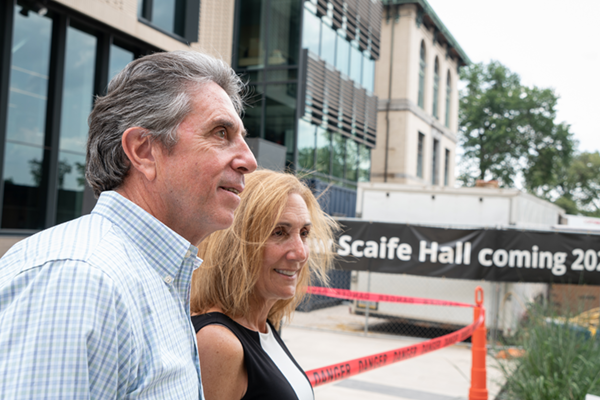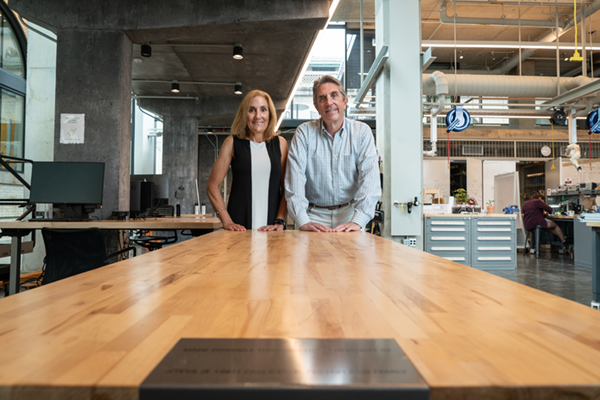From engineering to law
Alumnus Steve Fulton and his wife, Carol, are giving back to Carnegie Mellon University’s new Scaife Hall to encourage engineering students to embrace the power of dialogue.
Alumnus Steve Fulton (MechE/EPP ’81) has always had a passion for discourse and lively debate, inspiring him to pursue a career in law. Now, he and his wife, Carol, are giving back to Carnegie Mellon University’s new Scaife Hall to encourage other engineering students to embrace the power of dialogue.
Fulton was interested in the law from an early age. The first in his family to go to college, he chose to begin his journey in the College of Engineering. He felt a background in engineering would differentiate him from his peers. “I thought engineering was very helpful because it gives you a structured thought process,” explains Fulton.
Fulton’s love for the law found its way into how he approached much of his college experience. For example, during his freshman year he was less than pleased to be placed in a small double dorm room in Scobell House. His room seemed to be considerably smaller than what he saw across campus. Through some exploration, he realized that he was correct—so, he structured his argument and submitted an appeal.

Source: College of Engineering
Alumnus Steve Fulton and his wife, Carol, are giving back to CMU’s new Scaife Hall to encourage engineering students to embrace the power of dialogue.
“I ended up winning my appeal,” smiles Fulton. “One of my main arguments was that our room was so small that we had to get out of bed in shifts because there wasn’t enough space.”
Later, as a senior, Fulton challenged the price of vended soda on campus. The matter was resolved with a university-sponsored Santana concert for the student body.
After Carnegie Mellon, Fulton worked as an engineer at Westinghouse Electric Corporation before attending Harvard Law School. Through his 25-year legal career he spent time as partner in the global law firm Reed Smith LLP and served as vice president and general counsel at Respironics, a medical device company, which is now part of Philips.
“Having the engineering background [at Respironics] was really helpful because when we were making devices, I could wear two hats. I understood the technology and I also understood the legal ramifications of what we were putting on the market,” says Fulton.
Now retired, Fulton spends time helping small companies and volunteering as a coach for the mock trial team at Penn-Trafford High School, located southeast of Pittsburgh. He remains connected with Carnegie Mellon University as an alumnus, but also as a parent. His alma mater became a family affair with the graduation of his sons Bradley (MSE ’16 MechE ’17) and Kevin (DC ’14).
A lot of my growth as a person occurred at Carnegie Mellon, so I have fond memories.
Steve Fulton, MechE/EPP ’81 alumnus
Philanthropy has always been important to Fulton, and he began giving back to Carnegie Mellon in small amounts as a young alumnus. As someone who relied on a scholarship to attend college, he feels strongly about investing in education. With the construction of the new Alan Magee Scaife Hall of Engineering, he and Carol were excited about the opportunities it would provide to students. They recently made a generous gift to the project, naming the Fulton Terrace.
“A lot of my growth as a person occurred at Carnegie Mellon, so I have fond memories,” says Fulton. “I think education is really important. I know how important it was to me, and I think it's important for others as well.”

Source: College of Engineering
The Fultons also supported the construction of ANSYS Hall, naming a bench in the Tech Spark.
The Fultons are looking forward to seeing students benefit from the large outdoor spaces of the new Scaife Hall. These areas, like the Fulton Terrace, will foster community across the university and encourage discussion outside the classroom. Fulton believes that discourse among people from different disciplines or with opposing viewpoints is a vital component of the college experience.
The new Scaife Hall is set to be completed in 2023 and will be transformative for the College of Engineering. Double the size of the original building, it will create a new entrance to campus and open up into a pedestrian-only engineering and maker quad. Through the design of Scaife Hall, Carnegie Mellon hopes to organically spark innovation and inspire new ways of thinking about complex problems across the world.
